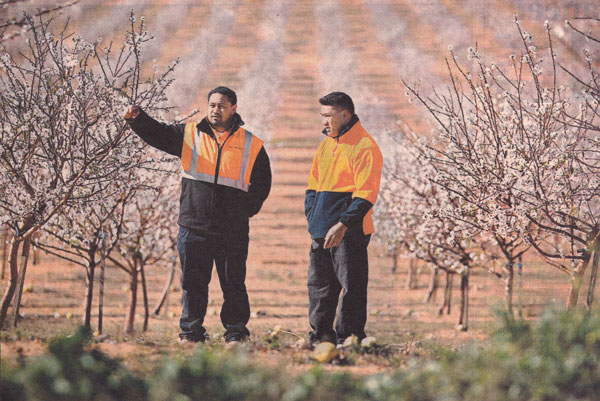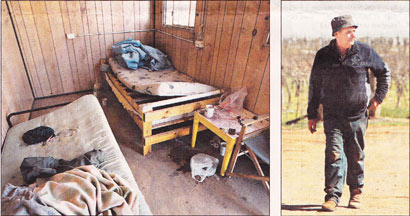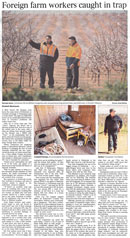This article appeared in the Australian 1 September 2008 p4

Foreign farm workers caught in a trap
A RED Ferrari 360 Modena tools down the main street of Robinvale on Saturday mornings. A Vietnamese man is at the wheel. The sight of a $260,000 sports car in a small agricultural border town in Victoria's northwest still makes heads turn. Only six or seven years ago, Van ``Nino'' Nguyen, the driver, was a labourer picking fruit. Now he is one of the richest men in the town, with a deep-sea fishing boat moored nearby on the Murray, and a BMW with ``Nino'' on the numberplate that he drives when the Ferrari is in the garage. But behind this remarkable immigrant success story is the bleak reality for many foreign farm workers. Ethnic contractors are supplying gangs of agricultural labourers, whose presence is changing the face of rural Australia. Robinvale has two Asian-owned groceries, an Asian-owned bakery, a shop selling Tongan favourites such as tinned taro, and a hairdresser who employs a Malaysian woman on a 457 visa to translate for customers. Twenty-seven nationalities are said to be in the town, one aspect of a phenomenon that heralds the future of regional Australia. With its pilot scheme to bring in a few thousand Pacific Islanders as fruit pickers, the Rudd Government has acknowledged the existence of itinerant workers from overseas. But experience in Robinvale reveals that Australia is creating a sub-class of workers unable to appeal to the authorities, whatever happens. ``If there's an accident, some just don't do anything; they cover it up,'' said a former fruit picker, recalling that one woman, an illegal who had been severely injured by a fellow worker, had to pay many hundreds of dollars for the ambulance that took her the 87km to Mildura hospital. |
Some illegal workers, paid under-award wages in cash, are forced to hand back 5 per cent of their earnings as well as pay contractors $8 a day for transport and up to $60 a week to rent mattresses in crowded firetraps or concrete-floored tin sheds. A local resident looked into one backyard to see a wooden fruit crate with a mattress in it -- and a piece of cloth tacked to it like a little curtain. ``It gets below zero here in winter -- how can they live in places like that?'' said John Katis, the Robinvale councillor on the Swan Hill Council. But fruit pickers know that if they want a job they have to take the accommodation. ``If you're illegal, the contractor can do anything he wants,'' said the former fruit picker. ``If they owe you wages and can't pay you, they dob you in to Immigration.'' Last July, 17 Malaysians, Filipinos and Thais who had been pruning vineyards were deported after an Immigration raid in the area. They were owed several weeks' wages. One woman told The Australian she had organised her trip rather than paying $5000 to an agent in Malaysia. Her contractor, a Vietnamese man she knew as ``Leroy'', had paid her $12.50 an hour (the award rate is $17 an hour). She was paying $60 a week for a mattress on the floor of a room she shared with four others, in a house with 20 workers. Chris Loy, the brigade support officer for Robinvale's Country Fire Association, believes such overcrowding is dangerous. ``We had a switchboard fire in a three-bedroom house in Robinvale with 12 people that we know of in it. We didn't realise until we went through the house that there was a rice cooker in every room.'' The electrical system was so overloaded there were power boards over powerboards. |
A few contractors say much the same thing. ``There's a lot of cases of sheds being filled up with people -- we're completely against that,'' said Alf Fangaloka, a director of the family-owned contracting firm Tree Minders, founded by his father, Sam, who sometimes preaches in one of Robinvale's six Tongan churches. When the family arrived in Robinvale in the 1980s, they lived in a dirt-floored hut. Now Sam Fangaloka has one of the biggest houses in Robinvale -- on a palm-fringed block next door to the house where rival contractor Nino Nguyen lives with his wife, Flora. Tree Minders is now owned by Sam Fangaloka's six children, who bought him out for $350,000. The business turns over more than $7 million a year, said Alf Fangaloka, 28. In summer they have up to 250 labourers working for almond producer Select Harvests, a managed investment scheme associated with the agribusiness Timbercorp. Fangaloka suggested his firm might be unusual in doing the right thing by its seasonal workers. ``There's a lot of contractors I won't work with -- I know how they treat their employees.'' Officially, growers pay contractors a sum based on minimum wages, with a loading to cover tax, superannuation, WorkCover and the contractor's fee -- generally 5 per cent. ``The contractors -- you see them driving in Mercedes. Is that all from the 5 per cent?'' said table grape grower Tony Natale. ``They'll charge you for the superannuation and what have you. Whether it goes to the poor guy at the other end, I doubt it.'' In summer, Natale needs 25 to 30 people for his 60ha. If he doesn't get them, the grapes will rot on the vines. |
But most of the workers, like much of the water, go to the managed investment schemes. Smaller growers take what they can get. ``The way the system is, you don't really know who the contractor brings along.'' Natale makes no secret of the fact that his own property was raided some years back. Immigration raids are a fact of life in towns such as Robinvale, where undocumented workers go bush for a few days if they get wind of a raid. Locals say those deported in recent months included a supervisor for Nguyen. Nguyen is overseas. Reached on his mobile, he denied employing anyone. He was reminded that he seasonally supplied more than 100 labourers to work in the olive groves for Boundary Bend, a Timbercorp MIS. ``I subcontract. I don't have anyone working for me. I'm in a meeting. I'm on holidays. ``Excuse me, you're not the tax office and you're not Immigration -- I don't have to answer you,'' he said. Boundary Bend managing director Paul Riordan said Nguyen supplied the company with workers to do everything from tractor driving to pruning and planting. ``He's got to provide us documentation for every worker,'' Riordan said. Growers and producers are no longer immune from prosecution if they indirectly employ illegal workers. But in the year since legislation was introduced to penalise employers for ``knowingly or recklessly employing illegal workers'', just six employers have been investigated and only one has been to court and pleaded guilty. |


